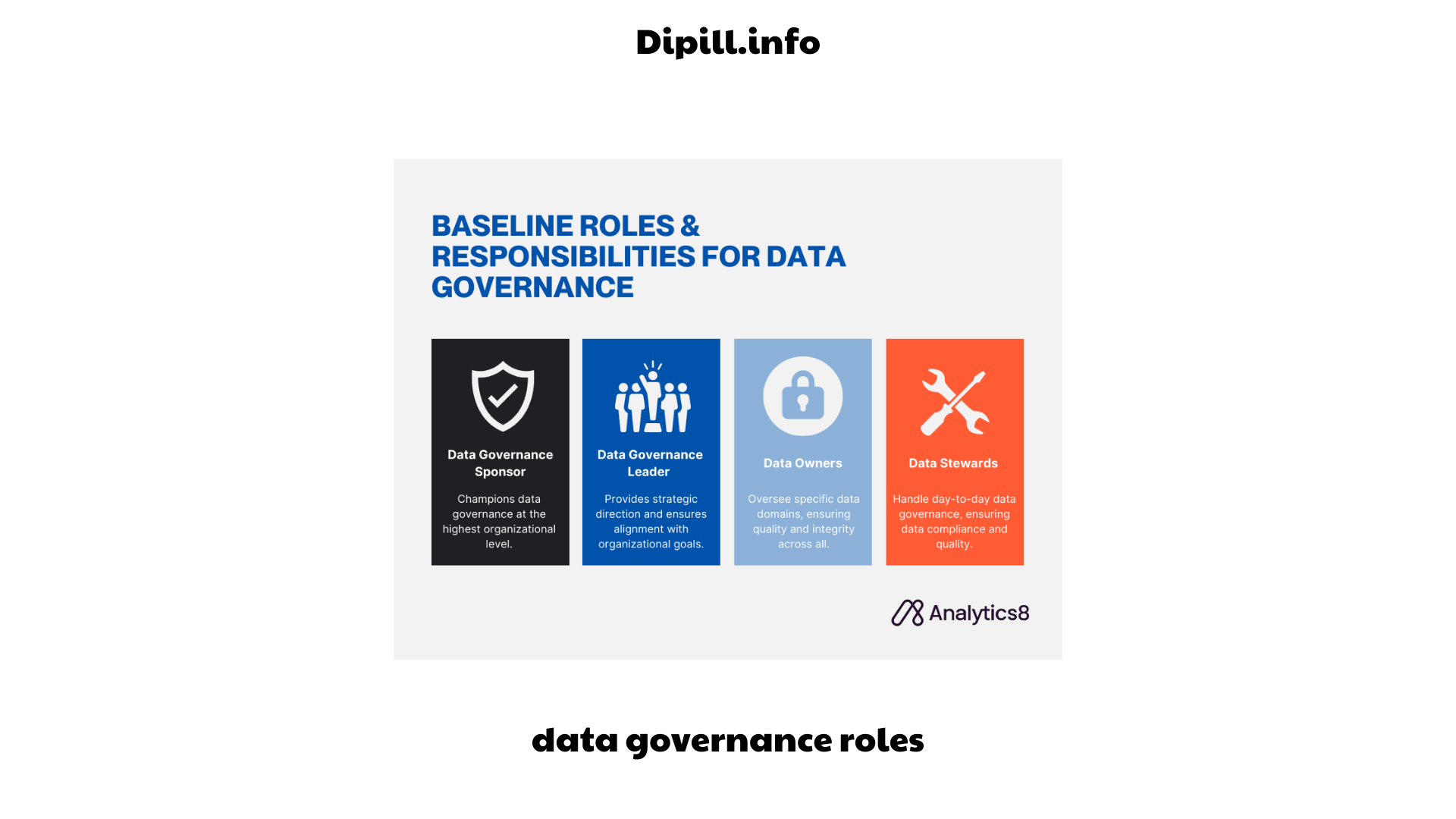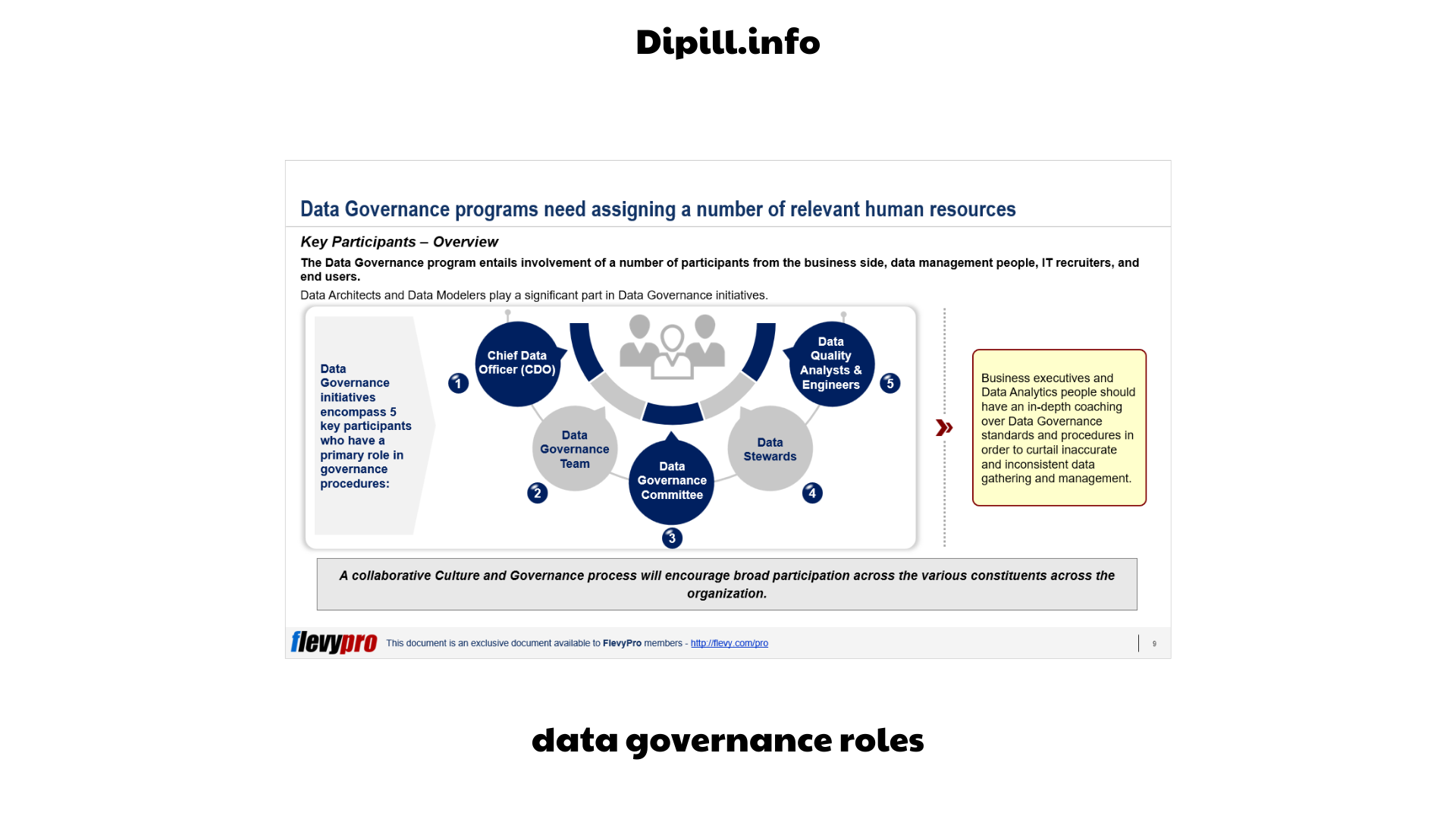In today’s data-driven world, organizations are increasingly recognizing the importance of data governance to effectively manage and utilize their data assets. Data governance roles governance encompasses the policies, processes, and responsibilities that ensure the availability, integrity, and security of data across an organization. A critical component of successful data governance is the assignment of specific roles and responsibilities to individuals or teams. In this article, Dipill will delve into the key responsibilities associated with data governance roles and shed light on their significance in driving data excellence.
Data Governance Roles: Understanding the Key Responsibilities
- Data Steward
The role of a data governance roles steward is crucial in ensuring the quality and integrity of data. Data stewards are responsible for defining and implementing data standards, policies, and procedures. They collaborate with data owners and users to understand data requirements, establish data quality rules, and enforce data governance policies. Data stewards also play a vital role in data classification, metadata management, and data lifecycle management. By overseeing data governance processes and promoting data quality, data stewards contribute to informed decision-making and reliable data analytics. - Data Owner
Data governance roles owners are responsible for the overall management and accountability of specific data assets within an organization. They are typically individuals or teams who have a deep understanding of the data, its sources, and its business context. Data owners define data usage policies, determine access rights, and ensure compliance with regulatory requirements. They work closely with data governance roles stewards to establish data quality standards and resolve data-related issues. Data owners play a critical role in balancing data accessibility and security, as well as aligning data governance efforts with business objectives. - Data Custodian
Data custodians are responsible for the technical implementation and maintenance of data management systems. They manage data storage, backups, and security controls to safeguard sensitive information. Data custodians collaborate with data stewards and data owners to ensure that data governance roles practices are implemented effectively. They also contribute to data governance by monitoring data usage, enforcing data handling protocols, and maintaining data documentation. Data custodians act as the bridge between data governance policies and the technical implementation of those policies. - Data Governance Manager
The role of a data governance roles is to oversee and coordinate data governance initiatives within an organization. They are responsible for developing data governance strategies, establishing governance frameworks, and defining data governance policies and procedures. Data governance managers work closely with stakeholders from various departments to ensure alignment with organizational goals and objectives. They facilitate communication and collaboration between data stewards, data owners, and other data governance roles roles. Data governance managers also monitor the effectiveness of data governance processes and drive continuous improvement.

- Data Quality Analyst
Data quality analysts are responsible for monitoring and assessing the quality of data within an organization. They develop and implement data governance roles quality metrics, conduct data profiling, and perform data quality audits. Data quality analysts collaborate with data stewards to identify data quality issues, investigate root causes, and recommend corrective actions. They also contribute to data governance roles by establishing data quality improvement plans and educating users on data quality best practices. Data quality analysts play a crucial role in ensuring high-quality data, which is essential for reliable decision-making and accurate reporting. - Data Compliance Officer
Data compliance officers are responsible for ensuring that data governance practices align with legal and regulatory requirements. They stay up-to-date with data protection laws, privacy regulations, and industry standards. Data compliance officers work closely with data stewards, data owners, and legal departments to develop and implement data governance roles policies and procedures. They monitor data usage, conduct privacy impact assessments, and ensure compliance with data protection regulations such as the General Data Protection Regulation (GDPR) or the California Consumer Privacy Act (CCPA). Data compliance officers help organizations mitigate risks associated with data breaches and maintain customer trust. - Data Architect
Data architects play a significant role in designing and implementing the data infrastructure necessary to support data governance initiatives. They develop data models, design data integration processes, and define data standards and guidelines. Data architects collaborate with data stewards, data owners, and IT teams to ensure that data governance roles requirements are incorporated into the overall data architecture. They also contribute to data governance by aligning data structures and systems with business requirements, optimizing data workflows, and ensuring data interoperability. - Data Governance Committee
A data governance committee comprises representatives from various data governance roles and stakeholders within an organization. The committee provides strategic guidance and decision-making authority for data governance initiatives. It defines data governance objectives, establishes policies, and resolves data-related issues. The data governance committee also ensures communication and collaboration between different data governance roles, oversees the implementation of data governance processes, and monitors the overall effectiveness of data governance efforts. The committee data governance roles acts as a central authority for data governance decisions and promotes a culture of data-driven decision-making. - Data User
Data governance roles users are individuals or teams who rely on data to perform their day-to-day tasks. They include analysts, managers, executives, and other operational staff who use data to make informed decisions. While not directly responsible for data governance, data users play a vital role in adhering to data governance policies and procedures. They collaborate with data stewards, data owners, and other data governance roles to understand data requirements, follow data access protocols, and provide feedback on data quality issues. Data users contribute to data governance by being active participants in data governance initiatives and promoting a data-driven culture within the organization.
- Chief Data Officer (CDO)
The Chief Data Officer (CDO) is a senior executive responsible for overseeing the organization’s data governance strategy and implementation. The CDO plays a crucial role in driving data governance initiatives, ensuring alignment with business objectives, and promoting data-driven decision-making across the organization. The CDO collaborates with data governance managers, data stewards, and other stakeholders to establish data governance frameworks, define data governance policies, and provide leadership in data governance activities. The CDO also advocates for data governance at the executive level, promotes data literacy, and fosters a data-driven culture throughout the organization.
In conclusion, data governance roles are essential for the effective management and utilization of data within an organization. Each role has specific responsibilities that contribute to data quality, integrity, security, and compliance. From data stewards and data owners to data custodians and data governance managers, these roles work together to establish data governance frameworks, enforce policies, resolve data-related issues, and promote a culture of data-driven decision-making. Understanding the key responsibilities associated with data governance roles is crucial for organizations aiming to harness the full potential of their data assets and drive data excellence.
Conclusion: So above is the Data Governance Roles: Understanding the Key Responsibilities article. Hopefully with this article you can help you in life, always follow and read our good articles on the website: Dipill.info
Related Articles
-
How to Find the Pixel 6 in StockNovember 24, 2022




